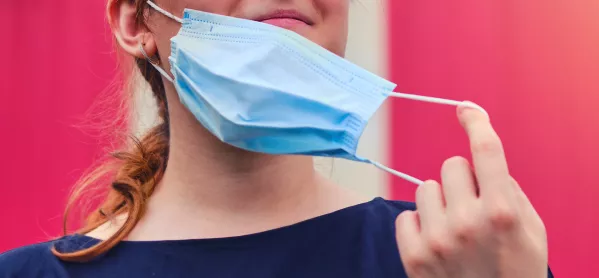PM tells schools to follow rules to ditch masks in class

The prime minister has urged teachers who insist masks should still be worn in lessons to follow the rules that state they are no longer required for use in classrooms.
A spokesperson for Boris Johnson said “children have been one of the hardest hit as a result of the disruption throughout the pandemic”, adding that Mr Johnson “believes it is vital that children are receiving face-to-face education and can enjoy a normal experience in the classroom”.
The spokesperson added: “The prime minister also thinks that the schools should follow the latest guidance”.
The comments come after teachers’ leaders criticised the government over an attempt to “micromanage” schools following an email from education secretary Nadhim Zahawi to MPs, which stated he will personally vet any plans set by local public health directors to bring back stricter Covid controls to manage outbreaks - such as masks in classrooms.
- Covid: School staff more likely to catch Covid than other workers
- PM: No masks in classrooms
- Masks: Lifting of class mask rule ‘balanced and proportionate’
In a letter to MPs sent on Thursday, Mr Zahawi said he has agreed with directors of public health that in the event of “extraordinary” local Covid spikes, they will consult with him before recommending the reintroduction of face masks in schools in England, “so that we can assess evidence and data to ensure any extra measures are proportionate”.
The largest teaching union said the letter is “utterly unnecessary, if not bizarre”.
Mary Bousted, joint general secretary of the NEU teaching union, said: “Schools and colleges who take the decision to keep face coverings as a requirement in classrooms will have… done so following a risk assessment, and with the head using his or her professional judgment and knowledge about what’s best for the school to protect face-to-face education.
“This is a sensible precaution, particularly given we are now in the run-up to national examinations and the issues to education caused by staff and pupil absences.
“That Whitehall would seek to micromanage such decisions seems utterly unnecessary, if not bizarre.”
Yesterday, Geoff Barton, general secretary of the Association of School and College Leaders (ASCL), said schools were “put in a potentially difficult position” with prime minister Boris Johnson’s announcement on Wednesday that face masks would no longer be needed in classrooms from Thursday.
“The government’s own guidance says that directors of public health may advise that face masks are needed in classrooms in response to local circumstances,” Mr Barton said.
“But schools are unlikely to have had any time in which to consult them, or in which to communicate the changes with parents and staff.
“It is therefore not surprising if some schools have continued to use face masks for the time being while they resolve these issues.”
Andy Byers, headteacher at Framwellgate School in Durham and a Schools North East advisory board member, wrote to parents after the prime minister’s announcement on Wednesday to advise the continuation of face masks for the next two to three weeks at his school, as case rates in the area “are still relatively high”.
Latest ONS figures show rising Covid rates in primary school pupils
The reaction to the email comes as the latest Office for National Statistics (ONS) figures show the Covid-19 infection rate is rising among primary school pupils while decreasing among secondary students.
The data published today shows the numbers testing positive was highest for those aged 2 years to Year 6. Just over eight per cent of this age group tested positive in the week ending 15 January, up from 7.3 per cent the previous week, the data shows.
Meanwhile, the percentage of Year 7 to Year 11 students testing positive stood at 5.3 per cent by the end of last week, down from 6.2 per cent the week before.
Register with Tes and you can read two free articles every month plus you'll have access to our range of award-winning newsletters.
Keep reading with our special offer!
You’ve reached your limit of free articles this month.
- Unlimited access to all Tes magazine content
- Save your favourite articles and gift them to your colleagues
- Exclusive subscriber-only stories
- Over 200,000 archived articles
- Unlimited access to all Tes magazine content
- Save your favourite articles and gift them to your colleagues
- Exclusive subscriber-only stories
- Over 200,000 archived articles
topics in this article



